A Silent Social Worker: Riaz A. Tehsin
Great nations write their autobiographies in three manuscripts – the book of their deeds, the book of their words and the book of their art, John Ruskin once said. If we go by that definition, one name that comes to mind which has contributed to the nation’s three manuscripts of deeds, words and art is Riaz A. Tehsin - a distinguished humanitarian, an educationist par excellence and a preeminent patron of culture and arts.
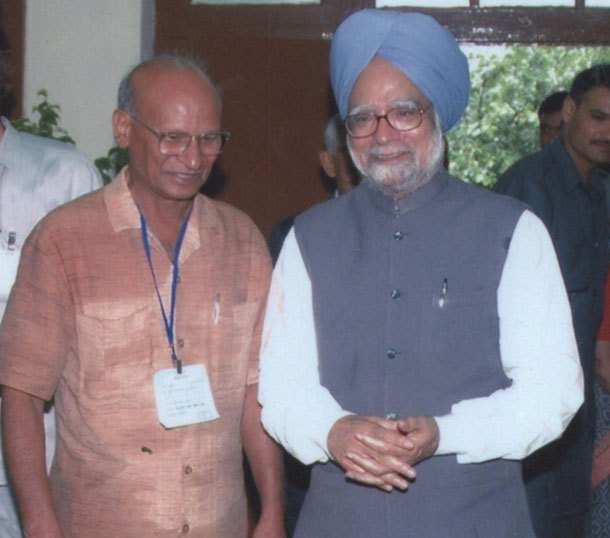
in Photo: Prime Minister Dr. Manmohan Singh is greeted at Vidya Bhawan’s Diamond Jubilee Function by President Riaz Tehsin
Great nations write their autobiographies in three manuscripts – the book of their deeds, the book of their words and the book of their art, John Ruskin once said. If we go by that definition, one name that comes to mind which has contributed to the nation’s three manuscripts of deeds, words and art is Riaz A. Tehsin – a distinguished humanitarian, an educationist par excellence and a preeminent patron of culture and arts.
Early Life and Childhood
Born on 20 September 1938 in a progressive family of Udaipur (Rajasthan), Riaz Tehsin is the son of the then Vice Mayor T. H. Tehsin, who later officiated as the Acting Mayor of the Udaipur Municipal Corporation. A social worker and nature lover, T. H. Tehsin was also an associate of Manikya Lal Verma and Mohan Lal Sukhadiya during the Independence Movement.
During his childhood, Riaz Tehsin’s inspiration came from his father as well as his mother Khursheed Banu, who, in spite of having a severe disability, worked for the emancipation of women. She was the Vice President of the Rajasthan Branch of All India Women’s Conference (AIWC), of which Maharani Gayatri Devi was the President.
Riaz Tehsin’s distinguished character, which saw its beginnings in the caring upbringing provided by his parents, was supported by Vidya Bhawan School, an institution with a vision.
Education, Youth
His interest in arts, culture, literature and social work was stimulated from his school days. He graduated from Aligarh Muslim University, and finished his Masters in Geology from Rajasthan University.
Following his literary penchant, Riaz Tehsin organised the first All India Mushaira at Udaipur in 1967 which included participants like Kaifee Azami, Nazeer Banarasi, Majrooh Sultanpuri, Kunw. Mahender Singh Bedi ‘Sahar’.
As President of Old Boys Association (founded in 1934) of Vidya Bhawan School, one of the oldest Alumni Association of India, he published a book ‘Crisis of Changing India’ in 1975, which was released by then Governor of Mysore M. L. Sukhadia.
In 1984, inspired by Brij Kishore Chandiwala (a close associate of Gandhiji), Riaz Tehsin gave up synthetic clothing and adopted Khadi, which he continues to wear till date.
Riaz Tehsin initiated the Gandhi Peace Foundation (GPF) centre in Udaipur. He first worked as its Treasurer, then as Vice-President and is now its President. In 1987, under the auspice of Gandhi Peace Foundation and Lisle Fellowship (USA), Riaz went to ‘Vishwaneedam Gandhi Ashram’ situated near Bangalore and worked with tribal along with Dr. R. R. Diwakar.
Under the same programme, he went to Rosebud Reservation, South Dakota, U.S.A. in 1988 to work with Native Americans (Red Indians). He lived in Gandhi Ashram Wardha in connection with G.P.F. programmes. Later, as ‘Sarvodaya Mitra’, he worked with Bhu-dani and Gram-dani farmers around Udaipur.
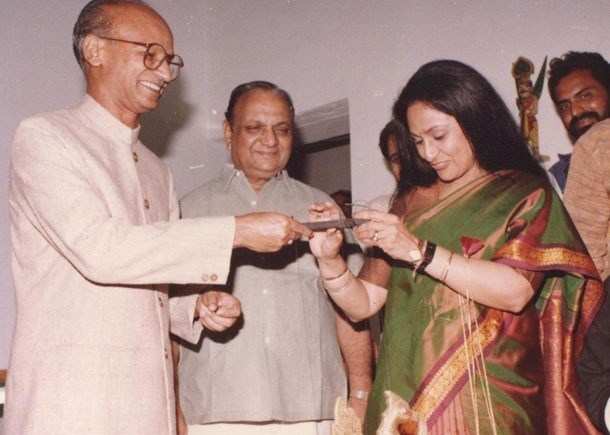 in photo: Hon. Secretary, BLKM, Riaz Tehsin explaining Puppetry to actress Jaya Bhaduri Bachchan
in photo: Hon. Secretary, BLKM, Riaz Tehsin explaining Puppetry to actress Jaya Bhaduri Bachchan
Achievements and Recognition
Recognizing his service to the community, the Head of Bohra Community, His Holiness Dr. Syedna Mohammed Burhanuddin conferred him the title of ‘N.K.D.’ – one of the highest honours given by His Holliness.
Riaz Tehsin is the Founder of Udaipur Chapter of Anjuman Taraqui Urdu (Hind). Under this, he organised various literary activities in Udaipur.
These include the 1984 Seminar on the ‘Role of Urdu in Indian Independence Movement’ and Mushaira, which was attended by Kaifee Azami, Khwaja Ahmed Abbas, Nazeer Banarasi, ‘Padam Shri’ Bekal Utsahi, Dr. Waseem Barelvi, Dr. Malikzada Manzoor among others.
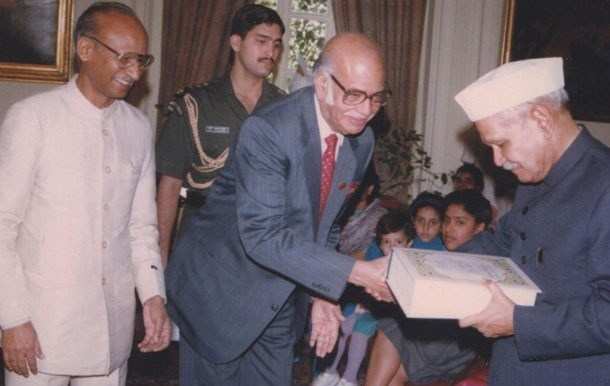
In Photo: President Dr. Shankar Dayal Sharma releases the collection of folk songs published by BLKM. Dr. Shoorveer Singh, President and Riaz Tehsin, present the first copy
In 1990, Dr. L. M. Singhvi, the then President of Bharatiya Lok Kala Mandal – a folk art institute founded by ‘Padam Shri’ Devi Lal Samar – requested Riaz Tehsin to take up the responsibility of Honorary Secretary, BLKM. Apart from several cultural activities in India and abroad from 1990 till date he is closely associated with publications which include ‘Lok’ (an academic exercise in folk culture), quarterly journal ‘Rangayan’ and a compilation of folk songs released by the then President of India Dr. Shankar Dayal Sharma in Rashtrapati Bhawan in 1994.
In the 1970s and 80s, Riaz Tehsin contributed regularly to leading national magazines such as ‘Dharmayug’, ‘Kadambini’, ‘Sarita’ on cultural and environmental issues.
From 1980 to 1993, Riaz played a key role in the resurrection movement of Vidya Bhawan Society, which was founded in 1931 by Dr. Mohan Sinha Mehta.
Former Education Minister of India Dr. Kalu Lal Shrimali has also been the founder and President of Vidya Bhawan Society.
In 1993, Riaz Tehsin became Vice-President with Prof. Jagat Sinha Mehta (former Foreign Secretary, Govt. Of India) as President and remained Vice President till 2005.
Riaz Tehsin has twice been elected the President of Vidya Bhawan Society – in 2005 and 2010 for a period of five years each.
Since 1993, the institutions under Vidya Bhawan Society have doubled with additions such as Education Resource Centre, Vidya Bhawan Prakriti Sadhna Kendra Gandhian Institute of Teacher’s Training, Vidya Bhawan Public School, Institute of Local Self Government and Responsible Citizenship (trained around 10,000 Elected Representatives of Panchayati Raj so far), S.T.C. Training Centre and a handmade paper unit attached to Vidya Bhawan Basic School.
Vidya Bhawan Society has been organising national and international seminars on education. These include ‘Construction of Knowledge’, ‘Language, Music, Mathematics and Society’ etc.
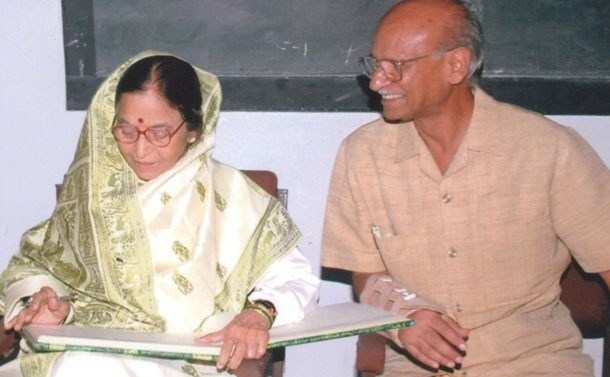
Pratibha Devisingh Patil, Hon’ble President of India, on her visit remarked about Vidya Bhawan, “The foundation of Vidya Bhawan was established in accordance with the values of Mahatma Gandhi. The guidance that has been provided by Shri Jagat Mehta and Mr. Riaz Tehsin has been appreciable. I am very impressed by the work done here as well as the work done by the Panchayatraj Training Centre.”
Prime Minister Dr. Manmohan Singh on the occasion of the Diamond Jubilee of Vidya Bhawan Society on 21st July 2006 observed, “Vidya Bhawan is one of our proud symbols of good citizenship. It has inspired generations of concerned citizens to step forward and contribute to social development.”
In 1995, Komal Kothari, the then President of Rajasthan Sangeet Natak Academy, appointed Riaz Tehsin as Executive Member. He served thrice as Executive Member, including a term as Treasurer. The budget allocation to the Academy was more than doubled during his term as Treasurer.
Apart from this, Riaz has contributed as Executive Member and Member of Advisory Committee of Seva Mandir.
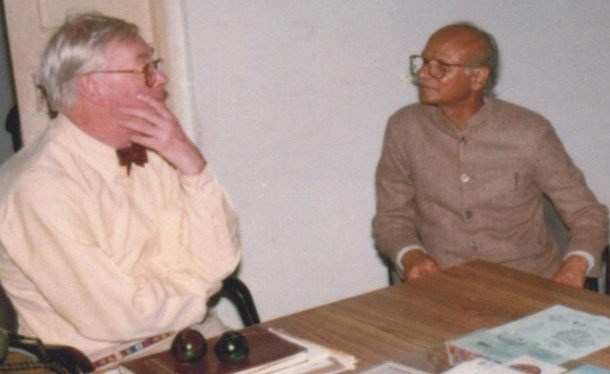 in Photo: Senator Daniel Patrick Moynihan discusses issues related to Local Self-Governance with Riaz Tehsin, Vice President of Vidya Bhawan Society
in Photo: Senator Daniel Patrick Moynihan discusses issues related to Local Self-Governance with Riaz Tehsin, Vice President of Vidya Bhawan Society
He is also the Executive Member of Dr. Mohan Sinha Mehta Memorial Trust, which is engaged in dialogue on volunteerism and responsible citizenship.
All the cultural, educational and social services rendered by Riaz Tehsin for five decades have been voluntary and without any remuneration or perks of any kind. He has been doing his bit with conviction, without looking for any reward or recognition. For his subsistence, he runs a small scale industry namely M/s. Tehsin Ecoplas Pvt. Ltd., an eco-friendly recycling unit which not only sustains his large joint family, but also provides livelihood to rag-pickers and tribals.
Riaz Tehsin has also carried forward the family tradition of several pioneering contributions to the economy of Southern Rajasthan. His grandfather A. K. Tehsin, established the first industry of Mewar in early 20th Century. His father T. H. Tehsin was a pioneer in mining in Mewar around the time of independence. Riaz established the first plastic processing industry of Southern Rajasthan in 1970.
Riaz Tehsin has nourished the roots of our culture, folk art, literature, industry, literacy, environment and economy in a unique way. He has been a visionary who has strived and succeeded to expand the horizons of freedom of thought, which measures the growth of any society.
To join us on Facebook Click Here and Subscribe to UdaipurTimes Broadcast channels on GoogleNews | Telegram | Signal


